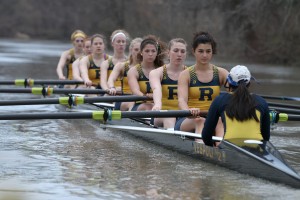Rowers don’t just compete against other teams. Intra-team competition is also crucial, with everyone striving for a spot in the top boat, a boat with only 8 spots for rowers and one for a coxswain, the person in charge of the boat.
“Intra-team competition is crucial for a growing team,” junior Serra Sevenler, one of the team’s captains, said “As a freshman, I looked up to the upperclassman and strived to one day beat their erg times. Now as an upperclassman, it’s my biggest wish for the underclassman to one day kick my [butt]. For a team to grow they must build off of each other’s success.”
Unlike in some sports, where many different factors go into positioning on the team, in rowing, one’s individual racing times take priority.
“We get boated at the beginning of the season with the fastest 8 people in the first boat, and the next fastest 8 people in the second boat,” junior Allie Born explained. “While the rowers in the second boat work as hard as they can to get into the first boat, this pushes the people in the first boat to also work hard to maintain their seats because they don’t want to be kicked out.”
Rowers strive to have lowest, fastest times possible in order to prove their power and endurance.
These numbers are measured on the ergometer, an indoor rowing machine that can be set for different distances.
The ergometer is the great equalizer, meaning only power and endurance matter. Body type, technique, balance are not considered with this technology. However, in boats on the water, where the team’s competitions take place, this does not apply. Two rowers with the same erg scores do not necessarily move the boat equally as fast.
For instance, a person who is 30 pounds heavier but pulls the same time on the erg as someone 30 pounds lighter, is, in reality, a slower rower on the water because they are weighing the boat down more for equivalent power.
This is where weight adjusting erg scores comes in to play. This is a technique used to compare times of people with different sizes, factoring in extra drag and lower drag based on weight.
But boats cannot be determined purely based on erg times.
There’s a common saying in rowing, “Ergs don’t float.” Even a person with strong erg times can lack in technique, making them a weaker rower than one with poorer erg times.
In addition to this, height is an advantage in rowing because those who are taller typically have a longer stroke to move more water.
This is where seat racing comes into play.
“When a rower in the second boat seems as fast as someone in the first boat, the rowers will seat race to determine who is actually faster,” Born said.
The seat race is when a coach compares two rowers with similar erg scores on the water. Two boats side by side, then one member of each boat switches before racing them again for the same distance. If a boat wins by a larger margin after this, the switch made the boat faster and that rower won their seat race, typically earning them a spot in a higher boat.
This weekend, a single coxswain and the top eight female rowers on the UR team competed in the Head of the Charles Regatta, held in Boston, Mass. on Sunday, Oct. 20.
This group is currently the strongest on the team and consist of coxswain senior Julia Evans, seniors Rhiannon Vaughn, Kristiana Lachiusa, and Monika Cepulis, juniors Emily Widra, Serra Sevenler, and Juliana Orlov, and sophomores Clare McMahon and Bella Clemente.
They had an impressive performance after receiving a lottery bid to the race, finishing sixth of 24 and earning the YellowJackets a spot in next year’s Head of the Charles Regatta, a prestigious regatta known worldwide.
“I was so excited to race there my senior year and I’m happy we could a place for the team next year,” Cepulis said about the weekend.
UR will wrap up their fall season next weekend when the travel across New York and comepete at the Head of the Fish Regatta in Saratoga, N.Y. The race will be the team’s last until March.
Cozen is a member of the class of 2015.







